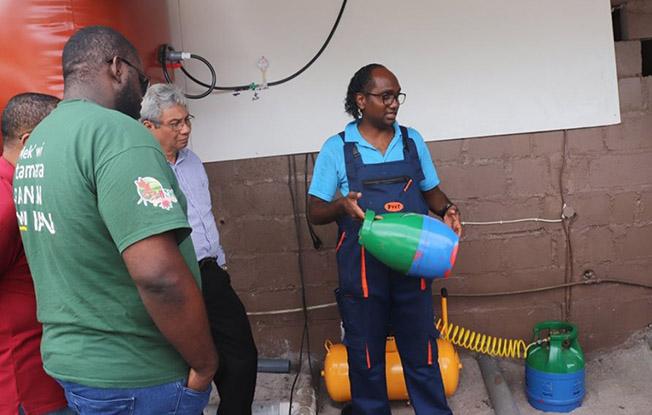Suriname lacks a sustainable waste management policy. Almost all waste produced in the country ends up in the environment. Not only household waste, but also human feces is dumped in nature. According to Samuel Kuik, biotechnologist and Managing Director of Slimgas Limited, an average of 200-300 cubic meters of feces is discharged into the Suriname River per day, where various fish species are also collected for consumption.
Kuik says this has disrupted the entire ecology of the river downstream to the sea. “This is disastrous for people, animals and the environment because of the chemicals used in toilets and in the septic tanks. People use the water along the rivers and creeks. The fish become resistant, carry microbiological contaminants, multiply and the entire environment is disturbed,” says Kuik.Kuik is at the forefront of an innovative approach to waste management and sustainable energy generation.
In 2018, he used his expertise in biotechnology to produce biogas for cooking purposes in Suriname. “Motivated by a desire to contribute something valuable to the country after completing my studies, I started a pilot project at home that same year. My focus was on converting organically degradable waste into sustainable renewable energy, with a specific emphasis on biogas for cooking and energy generation,” says Kuik. The test yielded positive results. The government noticed this and Kuik scaled up the project in 2019 with support from the Inter-American Development Bank.

Kuik explains how waste is processed into cooking gas. The biogas production process begins with the collection of different types of organic material, ranging from kitchen waste to septic waste and even leftover fruits and vegetables from the market.
This various organic waste is then processed. An incinerator is used in the kitchen, while a grinder is used for septic waste. Once reduced in size, the waste particles are mixed with water in an oxygen-free environment where microbiological organisms thrive, grow and multiply through the fermentation process. During this process, these organisms feed on the organic material, resulting in the production of valuable methane gas (CH4).“After the commercial phase comes the industrial phase and export, but unfortunately I was not able to achieve that, purely for political reasons.
Energy is the responsibility of the government and it determines where they want to go with the energy issue. You can generate it on a large scale, but it has to be sold and for that I need NV Energiebedrijven Suriname (EBS),” says Kuik. The result is that all the junk produced in Suriname still ends up in the environment. Kuik now produces for himself and a small group from the catering sector. Slimgas is linked to a production company called Orgie Kip, where the chicken waste is processed into an average of 5,000 liters of biogas.Kuik says that if he gets more fermentation tanks and the government agrees, the feces will no longer have to go into the river.
The economic and social benefits of processing waste into biogas will be enormous. “If we convert the septic tanks, social institutions will no longer have to pay for gas. For the interior of Suriname, the gas can be liquefied and residents will never have to buy diesel again or wait for diesel from the government to run their generators,” says Kuik. Despite the limitations, Slimgas does have some success stories. The company has been able to transform some foundations, recreation centers and restaurants, so they no longer have to buy gas from third parties. Slimgas does not sell biogas, but teaches institutions to process their own waste, so that they no longer have to buy gas. Despite the setbacks, he continues to believe that there will come a time when the Surinamese government will adopt the project for the whole of Suriname. “We see a future of savings and reducing environmental pollution. The risk of epidemic outbreaks is reduced, and there is also sustainable energy generation, which means less CO2 is emitted,” says Kuik.
This story was published by Starnieuws with the support of the Caribbean Climate Justice Journalism Fellowship, which is a joint venture between Climate Tracker and Open Society Foundations.